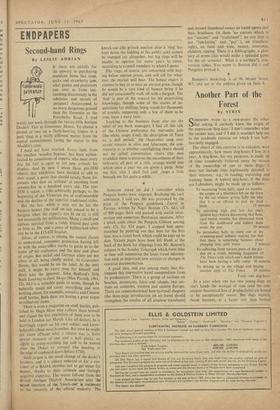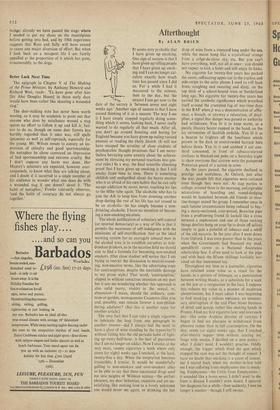Another Part of the Forest
By STRIX SOME-BODY wrote to a newspaper the other day asking if anybody knew the origin of the expression 'dog days.' I don't remember what the answer was, and if I did it wouldn't help me in the academic exercise on which I am half- heartedly engaged.
The object of this exercise is to calculate, very approximately, how many dog-hours I lose in a year. A dog-hour, for my purposes, is made up of time completely frittered away by reason of the ownership of one or more dogs; it does not include time legitimately devoted to their interests: e.g., in feeding, exercising and training them. A typical dog-hour, if the dogs are Labradors, might be made up as follows:
To recovering from Sally, aged six months. the corpse of a blackbird left on the lawn by the cat without giving Sally the idea that it is an offence to pick up dead
birds • • . • . • 15 minutes
To searching high and low for one's ignition-keys before discovering that Ross, aged twelve months, has abstracted them from the dashboard and hidden them under the scat .. .. 20 minutes To persuading Sally to come out of the swimming-pool without making her feel that there is something heinous about
plunging into cold water .. 5 minutes To collecting from various parts of the gar- den on a windy morning fragments of The Times with which one's dumb friends have been haying a jolly romp 10 minutes To driving up to the village and buying another copy of The Times .. 10 minutes Total---bne dog-hour. In a year when one has two young dogs on one's hands the wastage of time (and the con- sequent theoretical loss of productivity) are bound to be exceptionally severe. But dogs mature, thank heavens, at a faster rate than human
beings; already we have passed the stage where I needed to put my shoes on the mantelpiece before getting into bed, and by 1966 experience suggests that Ross and Sally will have ceased to cause any major diversion of effort. But when I look back on a misspent life I am faintly appalled at the proportion of it which has gone, irrecoverably, to the dogs.
Better Luck Next Time
The epigraph to Chapter V of The Making of the Prime Minister, by Anthony Howard and Richard West, reads: To .have gone after him [Sir Alec Douglas Home] in those early days would have been rather like shooting a wounded stag.'
The deer-stalking vote has never been worth wooing, so it may be academic to point out that anyone who does by mischance wound a stag spares no effort to follow it up and kill it; fail- ure to do so, though on some deer forests less harshly regarded than it once was, still spells ignominy as well as self-reproach, especially for the young. Mr. Wilson meant to convey an im- pression of chivalry and good sportsmanship; the metaphor he chose conveyed an impression of bad sportsmanship and extreme cruelty. But I don't suppose any harm was done. Her Majesty's ministers are expected, however over- sanguinely, to know what they are talking about, and I doubt if it occurred to a single member of his audience to wonder what one does do with a wounded stag if one doesn't shoot it. 'The habit of metaphor,' Fowler tolerantly observes, 'and the habit of accuracy do not always go together.'







































 Previous page
Previous page